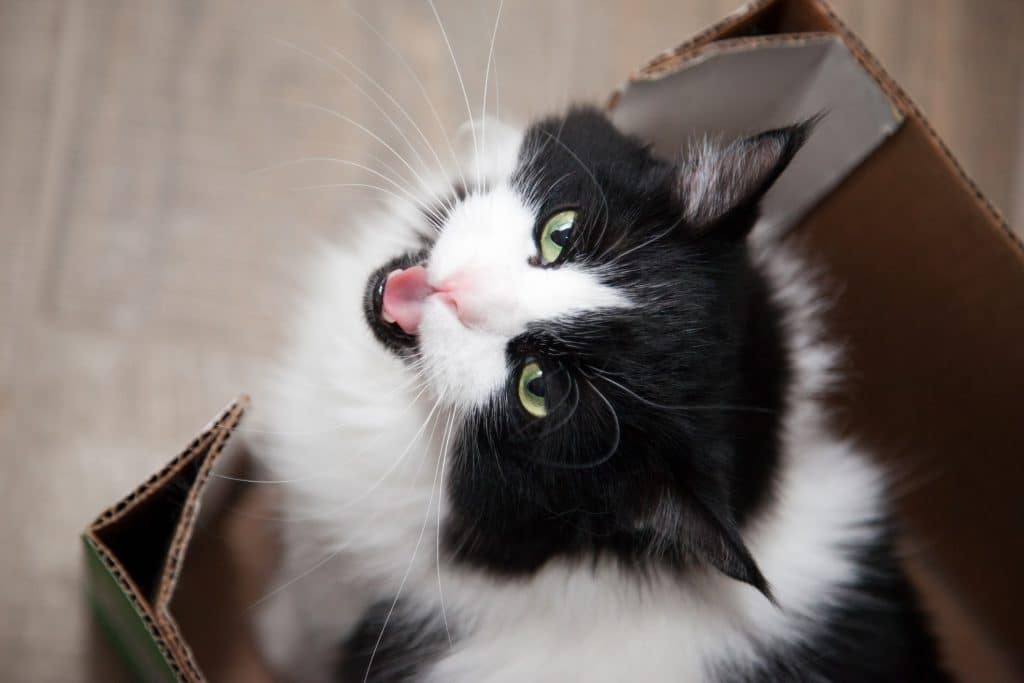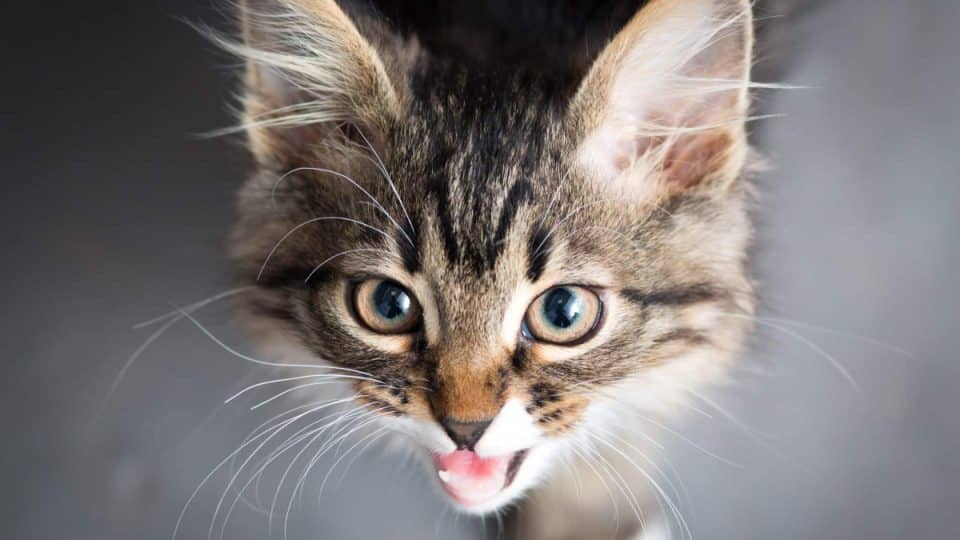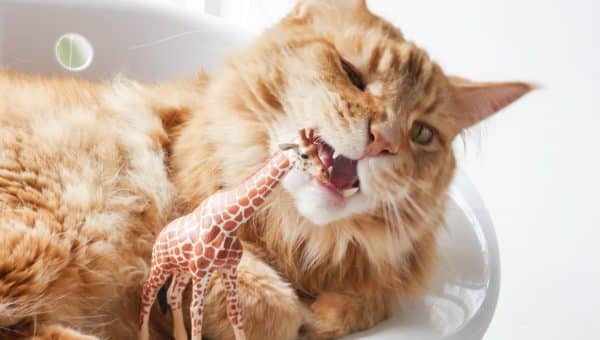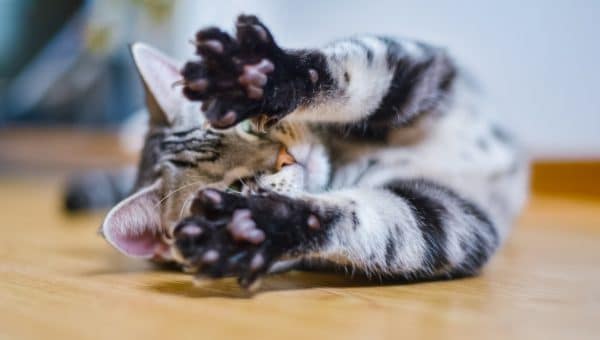- Not a substitute for professional veterinary help.
A cat’s meow is one of their most important ways to communicate with us. As pet parents, we can easily decipher what our cats are trying to tell us—for the most part, at least! While cats have many different types of meows, the most puzzling is a silent meow. When we expect to hear an adorable “meow,” our cat opens their mouth without making a sound. There are several types of meows and meanings behind these vocalizations, silent meows included. Sometimes, health problems can cause a cat to lose their voice. However, silent meows are most often a sign of communication and affection.
A silent meow may indicate cat laryngitis, depending on your cat’s health status. We spoke with veterinarians to find out how to differentiate between signs of affection and symptoms of a health problem when your cat silently meows and what to do next.
Why Do Cats Meow Silently?
Much like a human’s tone of voice, the way a cat meows can vary, including quiet and silent meows. Though it may seem unusual, especially for chatty cats, a silent meow doesn’t necessarily suggest a health issue in your cat. Stephen Quandt, CFTBS, founder of Cat Behavior Help, says there are various interpretations of what a silent meow might indicate.
“A lot of cat lovers believe the silent meow is an undying expression of love; they’ve just lost the ‘words’ to express it,” he says. “Others think silent meows are communicating hunger. [Finally], some people think the cat is ‘giving up,’ so instead of meowing, they’re just going through the motions.”
Quandt explains that the more likely explanations have to do with cat physiology. He points out that cats have far better hearing than humans and can hear considerably higher frequencies than we can perceive. So it’s likely that to cats, a silent meow isn’t quiet; it’s just too far above our hearing frequency range. Another possible explanation for a silent meow is that it’s a learned behavior to get their pet parent’s attention.
Ultimately, Quandt says what a cat’s silent meow means depends on what you want to believe.

iStock/Nils Jacobi
What’s The Main Cause Of Silent Meowing?
One of the main culprits behind silent meowing is feline laryngitis. This can affect the voice box (aka larynx) by causing inflammation and discomfort, resulting in a silent meow.
Feline laryngitis can have several underlying causes, including upper respiratory tract infection, inhalation of irritants, and trauma. A study found the condition can affect cats ages nine months to 18 years old.
A sudden halt to vocal meowing is a telltale sign of feline laryngitis, as well as a cough, bad breath, and difficulty breathing and swallowing. If you notice these signs in your cat, consult your vet, as these can be life-threatening when accompanied by stress, over-exercise, or laryngeal obstruction.
Does Anything Else Cause Silent Meowing?
Dr. Alex Schechter, the founder of Burwood Veterinary, breaks down other potential causes of silent meowing in cats and symptoms to watch for, including the following.
- Blockage in the larynx. Foreign objects or tumors may cause a blockage. Other symptoms include coughing, gagging, difficulty breathing, and wheezing.
- Inhaled irritants. Inhaled irritants in pets can cause inflammation of the larynx. Watch for symptoms such as coughing, gagging, and difficulty breathing.
- Hyperthyroidism. Common in older cats, hyperthyroidism is caused by an overactive thyroid gland. Other symptoms may include weight loss, increased appetite, thirst, and hyperactivity.
- Eosinophilic granuloma complex. Seen in younger cats, eosinophilic granuloma complex is an autoimmune condition affecting the skin and oral cavity. Watch for symptoms like skin or mouth lesions, excessive grooming, and loss of appetite.
- Paralysis of the laryngeal nerve. Relatively rare, laryngeal paralysis can be caused by nerve damage or trauma. Symptoms include difficulty breathing, wheezing, and changes in the pitch or volume of your cat’s voice.
- Benign or cancerous growths in the throat. Various factors can cause benign or cancerous growths in the throat, such as secondhand smoke, exposure to certain chemicals, or pollutants. Other symptoms may include difficulty swallowing, weight loss, lethargy, and changes in vocalization.

iStock/rustycanuck
Should I Stop My Cat Who Silently Meows?
Most of the time, there’s no reason to stop your cat from meowing silently. However, if they do so because of a medical condition, especially laryngitis, starting treatment immediately is essential.
Schechter explains several treatment methods to relieve feline laryngitis, stopping silent meows.
- Prescription medications/diuretics. Schechter says medications that suppress the immune system or antibiotics may be prescribed depending on if the inflammation is due to an autoimmune condition or bacterial infection. Administering over-the-counter pain relievers or anti-inflammatory medications only with guidance from your vet.
- Surgery. If objects are lodged in the throat, surgery is required for removal. Follow a vet’s guidelines post-surgery, like keeping your cat from jumping, to ensure the best results possible.
- Parasite treatment. Only for conditions caused by parasites, like eosinophilic granuloma, is parasite treatment appropriate. Speak with a vet to determine if anti-parasite medication is right for your cat.
- Home adjustments. Providing a soothing and calm environment can help minimize stress in cats. Additionally, Schechter explains that if the inflammation of the larynx is due to allergies, avoiding exposure to irritants and using a humidifier can be helpful.
- Switching to a soft, moist diet. If your cat has an inflammation of the larynx, Schechter recommends feeding a diet that’s easy to swallow. Here are our recommendations for the best cat wet food to keep your kitty full and with minimal inflammation.
Silent meowing is generally just one of the many ways cats communicate with us and show us their love. However, watching for certain signs can help determine whether your cat may be silently meowing due to a health condition. If so, the treatment options available can help restore their health—and their meow.





